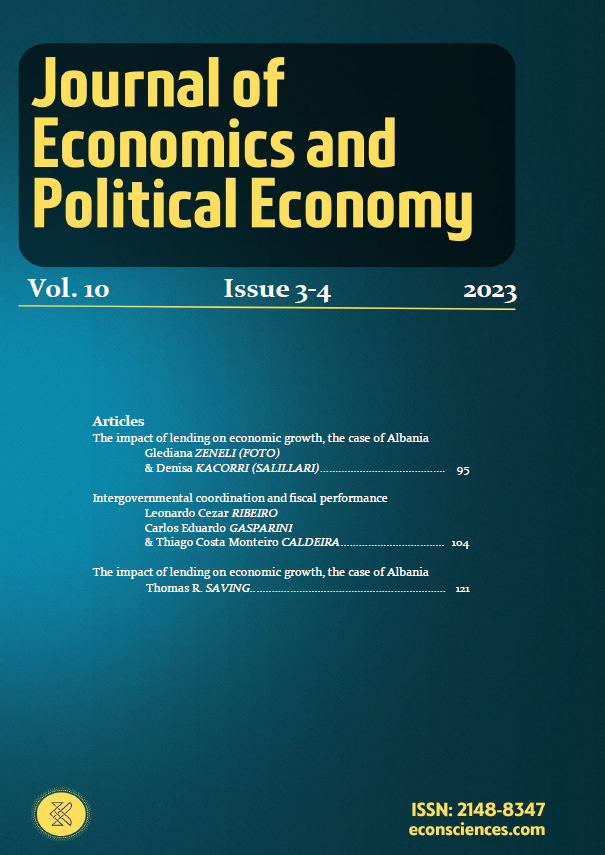Abstract
Abstract. Lending is an important element for the economy of a country. Credit leads to an increase in spending, thus increasing revenue levels in the economy. This revenue growth brings a higher GDP (gross domestic product) and thus increases productivity. This paper aims to analyze whether there is a correlation between private sector credit and economic growth for the period 1996-2021 in the case of Albania using econometric models. We have to say that credit is one of the important elements of the financial system. Financial development over the years has brought a variety of products offered by the banking sector. But we must remember that lending, which is one of the main elements of this system, was one of the factors that caused the global crisis in 2008-2011. Hence, this study aims to discern whether lending has positively impacted the Albanian economy or not, considering its potential negative effects. It is a widely held belief that the absence of credit prevents a country's economic development, and this paper seeks to determine the accuracy of this claim. Due to the negative impact of credits on the economy in this paper we intend to survey how the loan has really affected the Albanian economy.
Keywords. Bank lending; Financial development; Economic growth.
JEL. E43; E51; G38.
References
Cavallo, M. (2005). Government Consumption Expenditures and the Current Account. Federal Reserve Bank of San Francisco. 10.2139/ssrn.700845
Cottarelli, C., Dell’Ariccia, G., & Vladkova-Hollar, I. (2005). Early birds, late risers, and sleeping beauties: Bank credit growth to the private sector in Central and Eastern Europe and in the Balkans, Journal of Banking & Finance, 29(1), 83-104. doi. 10.1016/j.jbankfin.2004.06.017
Croitoru, A., (2012). Schumpeter, J.A., 1934 (2008), The Theory of Economic Development: An Inquiry into Profits, Capital, Credit, Interest and the Business Cycle, translated from the German by Redvers Opie, New Brunswick (U.S.A) and London (U.K.): Transaction Publishers (2012). Journal of Comparative Research in Anthropology and Sociology, 3(2), 137-148.
Erjona Suljoti, Gent Hashorva (2012) House prices and mortgage loan - Empirical evidence for Tirana. Bulletin of the Bank of Albania, January-June 2012 pp131-152.
Fry, M. (1988). Money, Interest and Banking in Economic Development. Baltimore, MD: The John Hopkins University Press.
Greenwood, J., & Jovanovic, B. (1990). Financial development, growth and the distribution of income. Journal of Political Economy, 98(5), 1076-1107. doi. 10.1086/261720
Gurley, J., & Shaw, E. (1967). Financial structure and economic sevelopment, Economic Development and Cultural Change, 15(3), 257-268. doi. 10.1086/450226
Habibullah, M.S. (2006). Does financial development cause economic growth? A panel data dynamic analysis for the Asian developing countries. Journal of the Asian Pacific Economy. 11(4), 377-393. doi. 10.1080/13547860600923585
Kalluci, G.S. (2012). Përcaktuesit e kredisë bankare për Sektorin Privat. Rasti i Shqipërisë. Banka e Shqipërisë. Tiranë.
Kar, M., & Pentecost, E.J. (2000) Financial development and economic growth in Turkey: Further evidence on the causality issue. Economic Research Paper, No.27.
Levine, R. (1997). Financial development and economic growth: Views and agenda. Journal of Economic Literature, 35(2), 688-726.
McKinnon, R. (1973). Money and Capital in Economic Development. The Brooking Institute, Washington DC.
Oluitan, R.O. (2012). Bank Credit and Economic Growth: Evidence from Nigeria. International Business and Management, 5(2), 102-110. doi. 10.3968/j.ibm.1923842820120502.1040
Robinson, J. (1979). The Generalisation of the General Theory. In: The Generalisation of the General Theory and other Essays. Palgrave Macmillan, London. doi. 10.1007/978-1-349-16188-1_1
Vika, I. (2009). The role of banks in the transmission of monetary policy in Albania, Bank of Albania, Working Paper, No.52.

This work is licensed under a Creative Commons Attribution-NonCommercial 4.0 International License.
